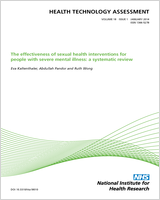Included under terms of UK Non-commercial Government License.
NCBI Bookshelf. A service of the National Library of Medicine, National Institutes of Health.
Hind D, Parkin J, Whitworth V, et al. Aquatic therapy for children with Duchenne muscular dystrophy: a pilot feasibility randomised controlled trial and mixed-methods process evaluation. Southampton (UK): NIHR Journals Library; 2017 May. (Health Technology Assessment, No. 21.27.)

Aquatic therapy for children with Duchenne muscular dystrophy: a pilot feasibility randomised controlled trial and mixed-methods process evaluation.
Show detailsBackground
Physiotherapy is thought to help children with Duchenne muscular dystrophy (DMD) stay physically active. Aquatic therapy (AT; also known as hydrotherapy), that is, physiotherapy in warm water, allows exercise and stretching that are not possible on land. It is not clear that AT works, so NHS access is limited.
Objectives
To see if a full-scale controlled trial (experiment) was feasible, we wanted to enrol 40 children to a pilot study, 20 of whom would have AT. We also tested the design and procedures.
Methods
All children were asked to do stretching and exercise at home. We planned that half would have AT in hospital pools for half an hour, twice a week, for 6 months. We measured how well they could use their legs at the beginning and end of the study. After this, children, parents and physiotherapists told us how they felt about AT and the study.
Results
We screened 348 children with DMD for the study. Only 12 could enter the study. This number is too low to show whether or not AT works. Those involved said that it should be offered nearer to their homes than we managed. The cost to the NHS for 6 months of hydrotherapy treatment was £1970–2734 per child.
Conclusions
An insufficient number of children could be found for a full-scale study run only from hospitals. Local AT programmes should be designed by specialist physiotherapists in liaison with children, parents, community physiotherapists and teaching assistants. Standard trial designs may not be feasible. Other research designs might be needed to test AT.
- Plain English summary - Aquatic therapy for children with Duchenne muscular dyst...Plain English summary - Aquatic therapy for children with Duchenne muscular dystrophy: a pilot feasibility randomised controlled trial and mixed-methods process evaluation
- Acknowledgements - Feasibility of a RCT of techniques for managing an impacted f...Acknowledgements - Feasibility of a RCT of techniques for managing an impacted fetal head during emergency caesarean section: the MIDAS scoping study
- Background, aims and objectives - The effectiveness, acceptability and cost-effe...Background, aims and objectives - The effectiveness, acceptability and cost-effectiveness of psychosocial interventions for maltreated children and adolescents: an evidence synthesis
- Results: clinical effectiveness - Nurse-delivered sleep restriction therapy to i...Results: clinical effectiveness - Nurse-delivered sleep restriction therapy to improve insomnia disorder in primary care: the HABIT RCT
- Theme 2: design and adherence to protocol - Clinical trial metadata: defining an...Theme 2: design and adherence to protocol - Clinical trial metadata: defining and extracting metadata on the design, conduct, results and costs of 125 randomised clinical trials funded by the National Institute for Health Research Health Technology Assessment programme
Your browsing activity is empty.
Activity recording is turned off.
See more...